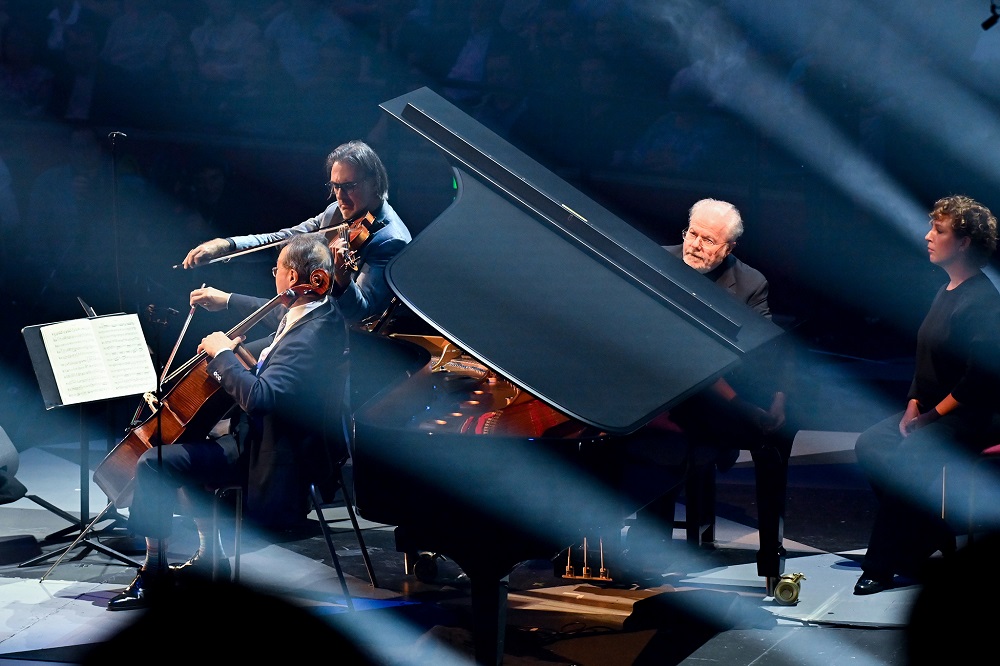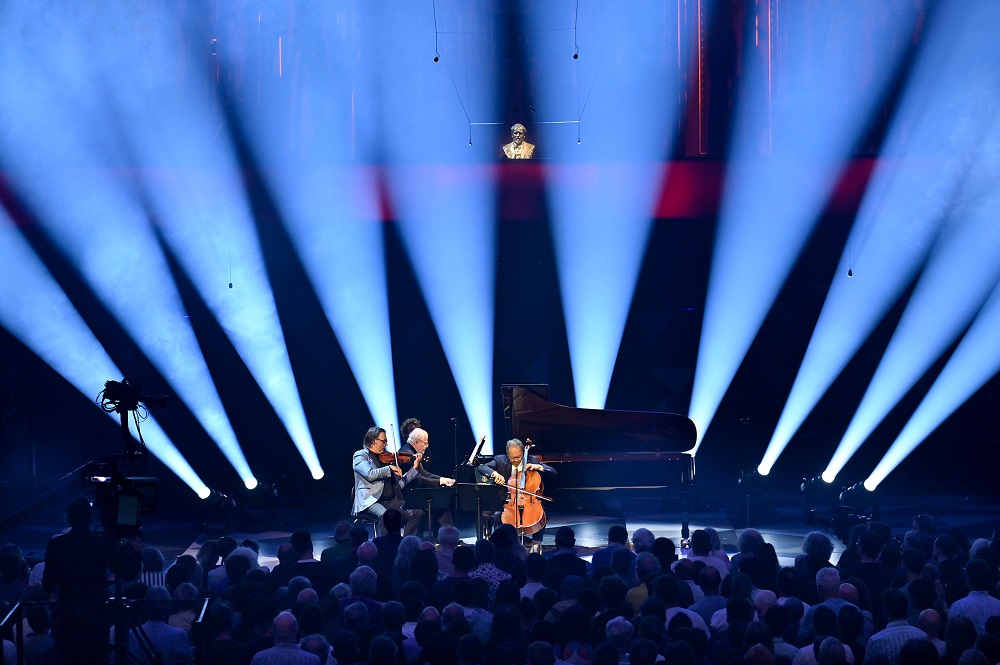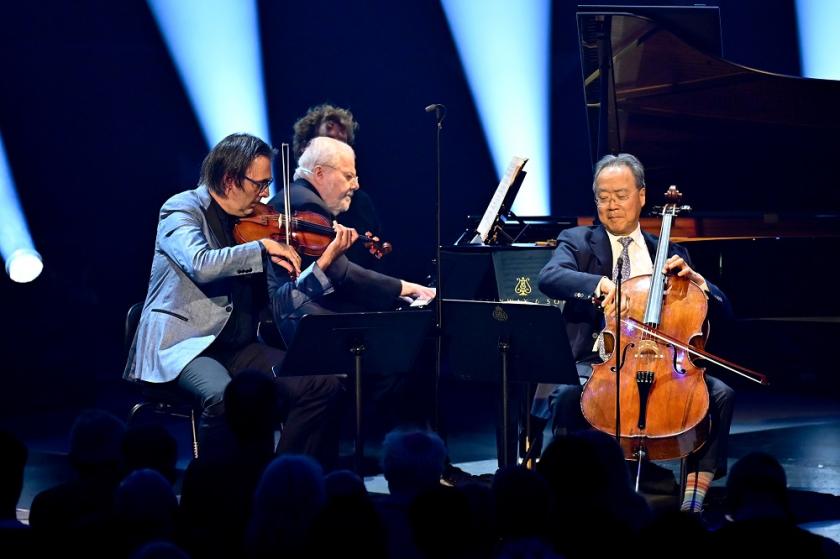In their lyrical, often intensely moving afternoon concert at the Proms, Yo-Yo Ma, Emanuel Ax and Leonidas Kavakos demonstrated such seamless communication that at points it was tempting to imagine that even their heartbeats were in sync. It’s an obvious statement to say that brilliant music making is as much about listening as playing, yet these three musicians took it to another level, deftly negotiating the Brahms and Beethoven with the elegance of bats finding their way by echolocation.
No surprise, perhaps, given that Ma and Ax have known each other since they were teenagers at the Julliard and Kavakos, despite being a relative newcomer to the group, has been playing with them for a decade. Each has such an international standing that it did not seem out of place for the programme notes to propose them as the Billion Dollar Trio, yet there was no sense of ego clashing here. At moments elements of the performances seemed almost too self-effacing for the size of the venue, as they deftly and sensitively explored every nuance of their repertoire.
The atmosphere in the hall was one of high excitement at the start of what was billed the Proms’ “Super Saturday”, with the Billion Dollar Trio in the afternoon prom, and the Berliner Philharmoniker bringing their traditional pedigree to the evening. For this first concert of the day, the three musicians were sat on stage surrounded by a constellation of lights that sent white beams streaming to the top of the hall – giving a slight feel that we were witnessing an alien invasion by a superior species.  A last-minute programme change meant that we would not be hearing them play Shai Wosner’s arrangement of Beethoven’s Symphony No 6 (Pastoral) for string trio – instead we were given Brahms Piano Trio No. 2 in C major. This mature work, written when the composer was 49, is today seen by many as an “unequivocal masterpiece”, though intriguingly when he was seeking guidance from Clara Schumann about whether she preferred this or another trio in E flat major, she made it clear that she opted for the latter.
A last-minute programme change meant that we would not be hearing them play Shai Wosner’s arrangement of Beethoven’s Symphony No 6 (Pastoral) for string trio – instead we were given Brahms Piano Trio No. 2 in C major. This mature work, written when the composer was 49, is today seen by many as an “unequivocal masterpiece”, though intriguingly when he was seeking guidance from Clara Schumann about whether she preferred this or another trio in E flat major, she made it clear that she opted for the latter.
Whether or not she was right is doomed for ever to be a mystery since unusually he decided she was wrong, and there is now no trace of the E flat trio. Today it’s difficult not to be swept away by the lyrical drama of the Brahms from the start, as the violin and cello drive the opening theme urgently upwards with the piano stoking the tension through its chromaticised response.
In this early part of the concert it was Kavakos who particularly shone – the limpid beauty and exquisite rapture of his playing seemed to cut effortlessly across the auditorium. Where his tone seemed agile and questing, Ma’s response was meditative and more introspective, while Ax – sometimes bell-like, sometimes sonorous – brought Brahmsian heft without ever threatening to overwhelm the other two.
At points the conversation between the violin and cello became more agitated and this was thrilling, like watching two birds with huge wingspans grapple for dominance until both took flight over clifftops. In the second Andante con moto movement the musicians were so profoundly tuned into each other, through body movement and eye contact, that it was as if they had become one being, completely possessed by the music. For the third Presto scherzo movement an energising frost-spiked tension was introduced, with the piano supplying shimmering arpeggiated waterfalls. Then for the final Allegro giocoso movement, we really felt the full timbre of Ma’s cello, providing rich earthy colours as together with Kavakos and Ax he brought the trio to its rich, resonant conclusion. Happily, the second half of the concert was still devoted to Beethoven’s Archduke Trio in B flat major, a great work whose status as a classic derives in no small part to the degree with which he was experimenting with the piano trio as a form. It would prove to be his last piano trio and it has the feel of a definitive statement whether in the geometric elegance of the opening theme or the stunningly calibrated variations of the Andante cantabile movement.
Happily, the second half of the concert was still devoted to Beethoven’s Archduke Trio in B flat major, a great work whose status as a classic derives in no small part to the degree with which he was experimenting with the piano trio as a form. It would prove to be his last piano trio and it has the feel of a definitive statement whether in the geometric elegance of the opening theme or the stunningly calibrated variations of the Andante cantabile movement.
Ma really came into his own here, swaying in time to the music, and leaning especially on the lower registers of the cello to bring a soulful eloquence to the harmonic dialogue. The almost translucent clarity of Ax’s piano was lifted by the lark-like sweetness of Kavakos’s violin. At points it was if the piano was creating whirlpools of energy with violin and cello sometimes soaring above, sometimes providing a muted accompaniment. The Andante cantabile movement was particularly exquisite, with its gorgeous hymn-like opening providing a launch point for the agile, quasi-philosophical explorations that followed.
An elated crowd stamped and roared for an encore and were rewarded with two. The first was particularly poignant – the Andante poco mosso movement of the Schubert B flat trio – which was dedicated to Rosemary Gent, a former organiser of the Proms who died after a short illness last December.
While the two programmed pieces had been nothing short of impressive, the heartfelt pathos with which the three performed this work in honour of their former colleague really took it to another level. The subtle colours in Ma’s performance especially shimmered like reflections on bronze. After more stamping and cheering, the musicians returned once more to the stage to perform a special arrangement for their trio of John Williams’ Schindler’s List theme. The enraptured audience would have happily stayed for more, but with the Berliner Philharmoniker ready to set up for the night, it was time for us all to move on.














Add comment